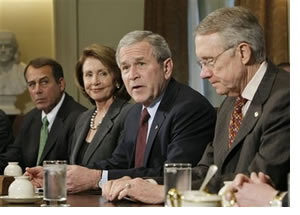US Recession Debate Turns Toward Inflation
Economics / Stagflation Feb 15, 2008 - 01:20 PM GMTBy: Michael_Pento
 The debate over the "R" word has been the focus on Wall St. for months on end. This obsession over whether the degree of the economic slowdown will in fact reach the technical definition of recession (2 consecutive quarters of negative GDP) is unproductive for the average investor. What investors need to know is that while economic growth is clearly weak, inflation is rising and that the current value of the stock market has not priced this in. Meanwhile, the Fed's response to this crisis is causing great harm to investors and could lead to hyperinflation in the long term.
The debate over the "R" word has been the focus on Wall St. for months on end. This obsession over whether the degree of the economic slowdown will in fact reach the technical definition of recession (2 consecutive quarters of negative GDP) is unproductive for the average investor. What investors need to know is that while economic growth is clearly weak, inflation is rising and that the current value of the stock market has not priced this in. Meanwhile, the Fed's response to this crisis is causing great harm to investors and could lead to hyperinflation in the long term.
The current P&E ratio on the S&P 500 is 18.3 times trailing 12-month earnings. The average is just over 15 for the history of the index--meaning it's not dramatically expensive compared to historical norms, but the market is certainly not cheap. What is not debatable is that the U.S. economy is flirting with a recession, if not officially in one and that inflation is at a multi-decade high. This recessionary environment is the result of a slowdown in consumer spending due to a lack of job and earnings growth, falling real estate values and negative equity market returns, while the inflation is the result of unprecedented levels of money supply growth.
Some will say that the government's stimulus package will shorten the duration of the economic contraction and that the economy will rebound in the second half of 2008. Sound familiar? We heard the same prediction in 2007. The truth is that the Fed can only control one rate and that is the rate banks charge each other for overnight loans. The Fed can't force banks to lend and cannot force overleveraged consumers to take on more debt. The point is that any interest rate reductions need time to work themselves thru the economy; giving consumers a one-time check does not force producers to increase the availability of goods and services.
Government Chooses the Inflationary Approach
 As to why our government continues to place its primary focus on monetary stimulus is beyond me. It seems apparent that we have tried this experiment before with disastrous results. The loose monetary policy of the 1970's and late 1990's resulted in massive inflationary imbalances in the economy. A much better approach would be the use of fiscal stimulus along with spending cuts that would reduce the size of government, lower inflation and interest rates, empower the individual and free market, and boost output and growth. But when was the last time you observed congress cutting spending while permanently lowering taxes?
As to why our government continues to place its primary focus on monetary stimulus is beyond me. It seems apparent that we have tried this experiment before with disastrous results. The loose monetary policy of the 1970's and late 1990's resulted in massive inflationary imbalances in the economy. A much better approach would be the use of fiscal stimulus along with spending cuts that would reduce the size of government, lower inflation and interest rates, empower the individual and free market, and boost output and growth. But when was the last time you observed congress cutting spending while permanently lowering taxes?
Unfortunately, our economy has become addicted to fiat money, leverage and debt. As a result, GDP growth now depends on ever-increasing asset price inflation. In order to keep the economy from sinking, the Fed must continuously increase the rate of money supply growth.
When the Fed attempted to reign in asset prices in the year 2000, they ended up quickly reversing course upon the collapse of the equity bubble. Today, we find after raising rates to just 5.25%--a historically low Fed Funds rate--the Fed was forced to turn on a dime as the collapse of the real estate bubble sent banks and the market into turmoil.
This course of action has us quickly approaching the point of no return. The Fed may soon have to decide between following the path towards hyper-inflation or allowing the economy to sink into a severe recession, one bordering on depression. I know that sounds like hyperbole, but you have to ask yourself what are the consequences of a Central Bank that is unable to raise rates without causing tremendous market dislocations.
With each passing interest rate cycle, the rate required to stimulate growth becomes lower and its duration must be protracted. The result is intractable inflation and that should lead investors to increase their purchases of precious metals and non-U.S. dollar denominated assets.
**NOTE : Listen to my brand new podcast, the Mid-Week Reality Check . Five minutes of sanity in an insane financial world!
Michael Pento
Senior Market Strategist
Delta Global Advisors
800-485-1220
mpento@deltaga.com
www.deltaga.com
With more than 16 years of industry experience, Michael Pento acts as senior market strategist for Delta Global Advisors and is a contributing writer for GreenFaucet.com . He is a well-established specialist in the Austrian School of economic theory and a regular guest on CNBC and other national media outlets. Mr. Pento has worked on the floor of the N.Y.S.E. as well as serving as vice president of investments for GunnAllen Financial immediately prior to joining Delta Global.
Michael Pento Archive |
© 2005-2022 http://www.MarketOracle.co.uk - The Market Oracle is a FREE Daily Financial Markets Analysis & Forecasting online publication.


